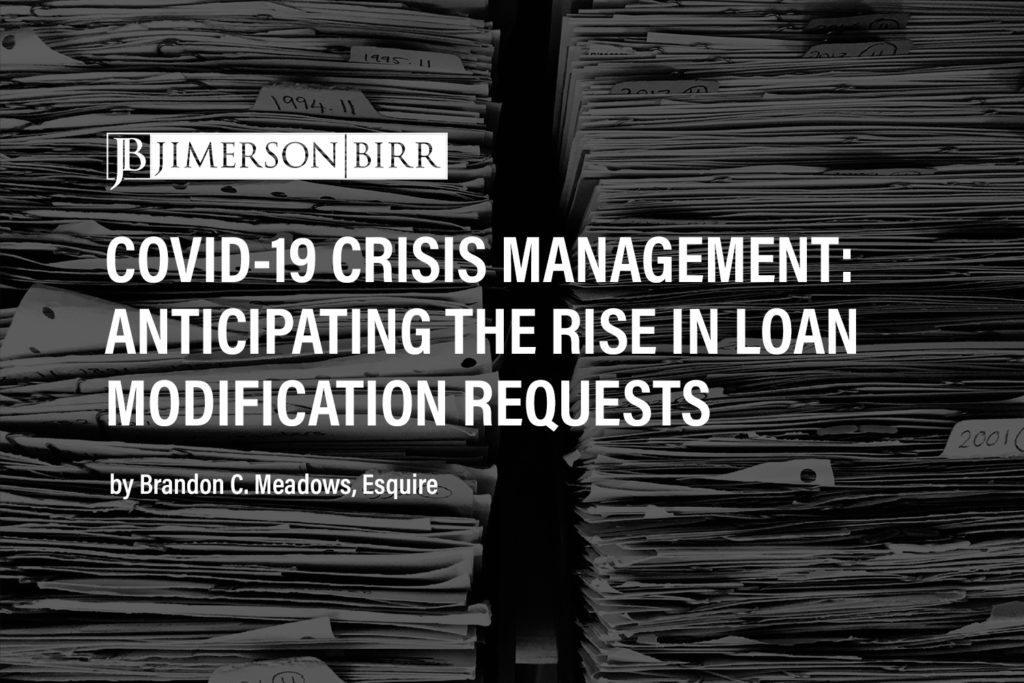The efforts to curb the spread of COVID-19 has caused an adverse ripple effect in the economy that will undoubtedly strain lending relationships and require widespread loan modifications. To assist borrowers and businesses with the anticipated volume of loan modification requests, the federal government and other federal agencies have offered guidance and legislation to encourage lenders to work with borrowers having trouble making payments due to the financial disruption of this public health crisis.
A. What Lenders and Servicers Should Expect regarding Loan Modification Requests in the Short Term
On March 26, 2020, the Federal Reserve and four other federal financial agencies (FDIC, NCUA, OCC and CFPB) issued a joint statement to encourage lenders to proactively address pending borrower defaults. That statements was followed by the March 27, 2020, enaction of the Coronavirus Aid, Relief, and Economic Security Act (CARES Act), which included several provisions to assist lenders in responding to the volume impending borrower defaults. Below are some of the recent highlights affecting lenders and servicers:
- Relaxed Accounting for Loan Modifications – Under GAAP accounting, if a lender makes concessions that it would not consider due to the debtor’s financial difficulties, that debt restructure is classified as a troubled debt restructuring (“TDR”). Now, Lenders may elect to suspend the GAAP requirements for loan modifications related to the pandemic that would otherwise be categorized as a TDR and suspend the determination that a loan is a TDR.
- Reporting Delinquent Loans – Loans that were otherwise “current” can receive payment accommodations without being reported as non-performing. Lenders are not expected or required to classify loans with deferrals granted due to COVID-19 as past due, so long as all payments are current with the revised terms of the loan. For borrowers who were past-due prior to the pandemic, the FDIC’s position is that delinquency status may be frozen for the duration of the payment deferral period. Note that past due reporting status should be determined by the contractual terms of the loan, as revised, and lenders should be cognizant of the payment dates in the loan documents. Further, lenders will need to act quickly to take advantage of the reporting requirements for loans to borrowers who are current
- Nonaccrual Status Reporting and Relaxed Standards for Credit Losses – Each lender should refer to its applicable regulatory reporting instructions in determining whether to report short-term loan modifications as nonaccrual assets. The CARES Act relieves banks from current expected credit losses standards, which typically require lenders to forecast loan performance for reserve purposes. Prudent lenders should recognize credit losses under their own charge-off policies as soon as a loss can be reasonably estimated.
B. Long-term Loan Modifications will be Required, and Lenders Should be Prepared to Document a Volume of Loan Modifications
Note that much of the recent guidance and legislation is focused on short-term relief, including payment deferrals, forbearance, fee waivers and other insignificant changes. But what happens at the end of this short-term forbearance or deferment? Borrowers are already facing confusion and frustration with the current short-term options on the table. In the long run, classic forbearance and deferment may not be enough, and many loans will require documented loan modifications.
Below is a check list of items lenders and servicers should follow in conducting diligence and documenting long-term loan modifications.
Analysis of Loan Documents
- Identify any existing borrower or guarantor defaults
- Analyze of all material financial covenants and assess prospective risk of borrower default
- Analyze force majeure clauses and the effect on repayment
- Assess lender’s covenants, including ongoing funding obligations
- Watch out for lender liability issues (i.e. refusing a borrower-requested draw, calling default unrelated to payment default, act reasonably and in good faith)
- Material adverse change provisions (for revolving LOC)
- Analyze lender’s escrow obligations for payment of real estate taxes and property insurance
- Request and review updated financial statements of borrower and affiliated entities, including property operations budget, cash flow forecast, rent rolls and other related financial disclosures
Analysis of Loan Collateral
- Review and assess liens on collateral, including perfection and recordation
- Mortgages (real property)
- UCC Liens (personal property)
- Real Property Collateral Assessment
- Review chain of title and lien priority
- Review title policy
- Evaluate and confirm real estate taxes are current
- Environmental due diligence
- Review guarantor obligations and evaluate sufficiency of existing guarantees
- Evaluate potential bankruptcy risks in light of any additional collateral or advanced loan proceeds
- Assess existing leases of the premises and obtain assignment of rents, tenant estoppel certificates, and/or subordination agreements with tenant
- Identification of potential mechanics liens or construction liens
Document Loan Modification
- Draft and record Modification of Mortgage and/or Security Agreement
- Include escrow terms if not in original mortgage
- Borrowers No Lien Affidavit
- Affidavit of Continuous Marriage (if necessary)
- Power of Attorney (if necessary)
- Good standing review and authority for commercial borrowers and guarantors
- Retire mobile homes (convert to real property), as necessary
- Obtain title insurance
- Assess and pay documentary stamp taxes for modification
C. Takeaways for Lenders and Servicers
The current public health crisis has also created economic devastation that can only be mitigated through proactive and prudent lending practices. Lenders are encouraged to make short-term concessions at the forefront of this crisis, but Lenders should also be prepared for the long-term ramifications that will undoubtedly require documented loan modifications. Lenders should start developing communications protocols, systems and processes, and affiliation with counsel to address the impending volume of loan modifications that will be required in the next year.

